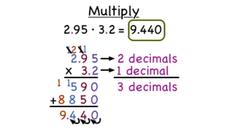Curated OER
How Do You Multiply Decimals?
Find the product of numbers that have decimals. First, ignore the decimals and multiply the integers. Second, count the place values of the decimals for each value given. Third, add the values together. Fourth, place the decimal in the...
Curated OER
How Do You Do Long Multiplication?
Multiplying multi-digit numbers without a calculator. First, make sure you align the numbers properly. It's not just about multiplying, there's carrying numbers and adding numbers and placeholders. You can do it, just remember to line up...
Curated OER
How Do You Do Long Multiplication?
Multiplying multi-digit numbers without a calculator. First, make sure you align the numbers properly. It's not just about multiplying, but there's carrying numbers and adding numbers and placeholders. You can do it, just remember to...
Mathispower4u
Solving Two-Step Equations Using Integers (Example 2)
Add, subtract, multiply, or divide ... which is the right operation to use? Give your classes some insight into using these operations to solve two-step linear equation using a video tutorial. The lesson describes how and when to use...
Northeast Arkansas Education Cooperative
Adding and Subtracting Polynomials
Algebra tiles help pupils understand many different algebra topics. The video explains the process of adding and subtracting polynomials using the tool. Seeing the terms as individual tiles helps learners understand the idea of a...
Mathispower4u
Solving Two-Step Equations Using Integers (Example 1)
Solving two-step equations is twice as fun as one-step equations! A thorough lesson shows the steps to solving two-step equations. Learners watch as the instructor not only explains how to use each operation but also explains why the...
Curated OER
How Do You Subtract Fractions with Different Denominators?
Combining fractions with unlike denominators. Wait! You can't do that! You have to have common denominators to combine the numerator of fractions. Here's a quick review of changing the denominator by multiplying each fraction by that...
Northeast Arkansas Education Cooperative
Polynomial Operations
This overview of polynomial operations does a solid job of summarizing how a mathematician attacks adding, subtracting, and multiplying polynomials. With particular emphasis on combining like terms and when exponents do and do not...
Curated OER
What are the Inverse Properties of Addition and Multiplication?
The instructor demonstrates that when you add the opposite value of a given number to that number you will always get zero. Then she shows how multiplying by the inverse of any number except zero will equal 1.
Curated OER
What is the Formula for the nth Term in a Geometric Sequence?
What is the difference between an arithematic sequence and a geometric sequence? In an arithematic sequence the constant ratio is added, and in a geometric sequence the constant ratio is multiplied. Watch this video and learn how to use...
Khan Academy
SAT Prep: Test 7 Section 8 Part 4
Finishing this practice session, Sal takes care to address the last three problems, which are also the most complicated of the set. Problem 14 is a tricky algebra question that results in Sal plugging in the multiple choice answers to...
Curated OER
How Do You Solve a Word Problem Using an Inequality With Variables on Both Sides?
Don't skip this word problem! Take one piece at a time in writing out this inequality. Once you have an expression that represents the words in this inequality, the rest will seem easy. So watch this video to get a better understanding...













